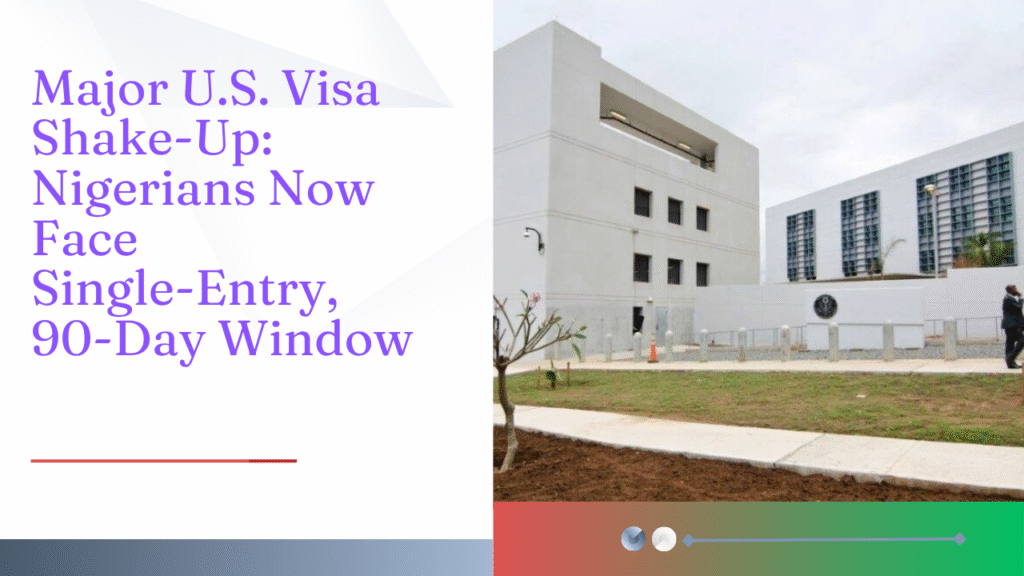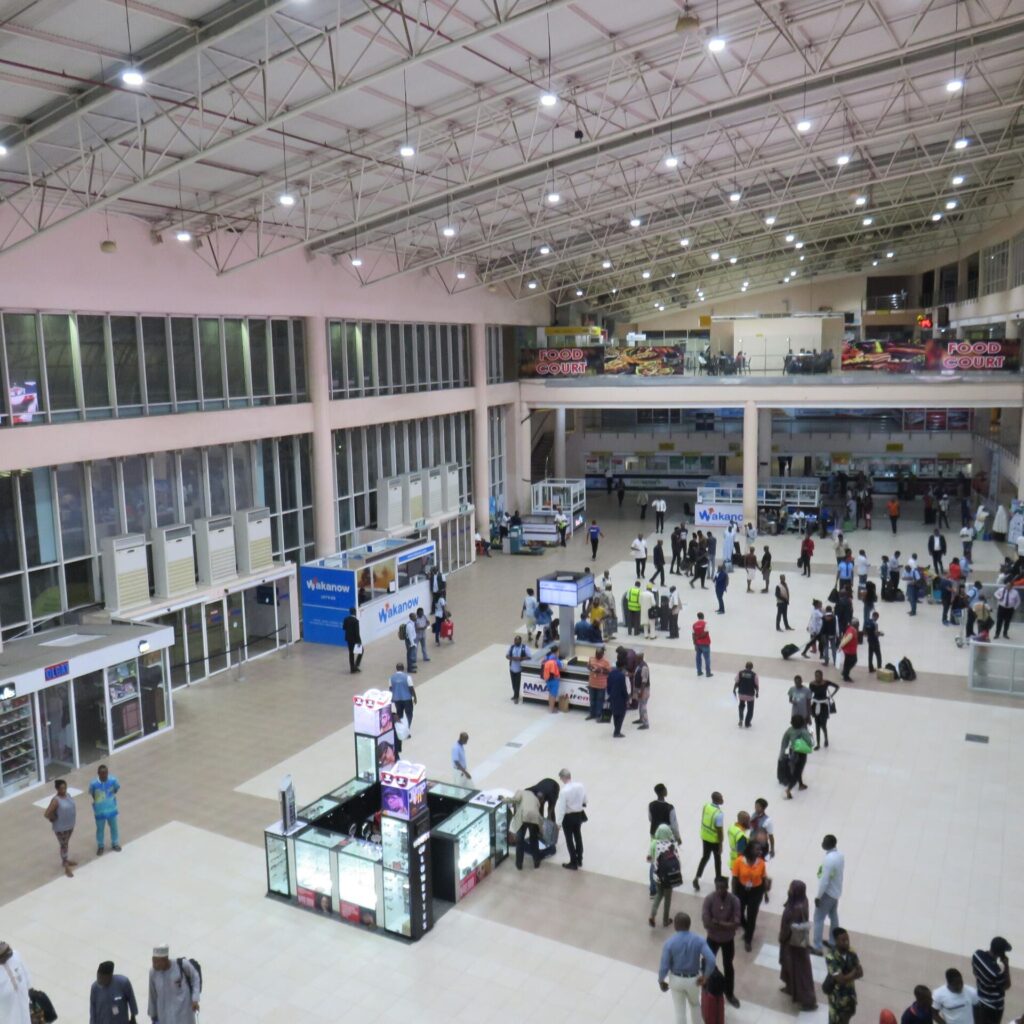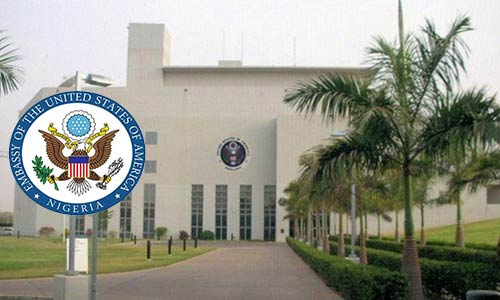
As of July 8, 2025, the U.S. government has introduced new visa rules specifically for Nigerian applicants. If you are planning to travel to the U.S. for study, business, tourism, or other reasons, read this first!
At Fly Consular, we bring the latest travel news to you, here’s a simple breakdown of what has changed and how it affects you.
What Has Changed?
1. Single-Entry Only
Under the new rule, Nigerians applying for most U.S. nonimmigrant visas (like F-1 student visas, B1/B2 tourist visas, H-1B work visas, etc.) will now receive single-entry visas.
This means:Once you enter the U.S. with that visa, you can’t use it again after leaving.If you return home for any reason, you’ll need to apply for a new visa before going back.
2. 3-Month Visa Validity
The new U.S. visa issued in Nigeria will only be valid for 3 months from the date it’s issued. So, if you delay your travel beyond that 90-day window, the visa expires even if it hasn’t been used.

Who Is This New Policy Affecting the Most?
1. Students on F-1 Visas
Although the visa itself is only valid for 3 months and single-entry, the I-20 form you receive from your school still allows you to stay in the U.S. for the entire duration of your studies.However, if you travel home while your studies are ongoing, you’ll need to apply for a new visa before you can re-enter the U.S.
2. Businessmen & Professionals
This is where things get complicated. If you’re someone who frequently travels for: International business meetings, trade shows and expos, Tech conferences, Negotiations or project launches…then this policy is a serious disruption.
You can no longer get a multi-year, multiple-entry B1 visa and move freely in and out of the U.S. for your engagements. Every trip now means a new visa application.That’s more time, more paperwork, more fees, and less flexibility.
3. Frequent Flyers & Dual Residents
Nigerians who regularly visit family in the U.S., travel for healthcare, or spend part of the year abroad (especially retirees or working-class professionals with U.S. ties) will also feel this impact.
Your travel habits will need to change. No more impromptu visits. No more hopping back in for events, emergencies, or business follow-ups — unless you’ve already applied again.
U.S. Rationale: Why did the Policy Change?
The policy isn’t a random decision. According to the U.S. Department of State, the change is based on visa reciprocity. Here’s what that means:
“The U.S. gives your country’s citizens the same visa privileges your country gives to U.S. citizens.”
Currently, U.S. citizens applying for a Nigerian visa receive single-entry, short-validity visas — so the U.S. is simply matching that policy. They also cited: Global security standards, the need for secure travel documents, Concerns about overstays and illegal immigration.

What the U.S. Embassy and Nigerian Officials Are Saying
The U.S. Embassy in Nigeria stated that the visa terms were being “adjusted for reciprocity” and emphasized that this is a routine review, not a targeted punishment.They also reassured students that visa expiration does not affect their right to stay in the U.S. during their program, but warned that any return trips would require new visa applications.
Nigerian Government
Nigeria’s Ministry of Foreign Affairs said it did not make any new policy that triggered this, implying the U.S. acted unilaterally based on long-standing visa terms. While the Nigerian government hasn’t officially responded with a counter-policy, the ball may now be in their court if they want to negotiate better treatment for Nigerian travelers.
Are There Any Exemptions?
Yes. The following groups are not affected by the new visa policy:
Visas Issued Before July 8, 2025Your current visa still works under the old rules (e.g., 2 years or 5 years, multiple-entry).
Diplomatic & Government OfficialsVisa holders under A, G, or NATO categories (e.g., diplomats, official delegates) are exempt.
U.S. Green Card Holder already have permanent residence? This policy doesn’t affect you at all.
U.S. Citizens of Nigerian Descent
If you’re using a U.S. passport, this change isn’t your concern. No visa required.
No exemptions have been announced (yet) for:Students, Business travelers, Health travelers Religious event attendees and Spouses of U.S. citizens who haven’t gotten green cards yet.
Practical Advice; What You Should Do Now
At Fly Consular, we help Nigerians prepare for successful U.S. visa applications, from documentation to interview coaching — and these new rules make that preparation even more important. If you’re preparing for a U.S. trip, here’s how to move smart under this new rule:
Apply Early: U.S. visa appointment dates can take weeks or even months. Start your application on time.
Plan Your Entry Carefully: Once your visa is issued, you have just 90 days to enter. Miss that window and the visa is wasted.
Avoid Unnecessary Travel During Your Program (For Students): Mid-semester visits back home could leave you stranded unless you’re ready to reapply.
Be Strategic with Business Trips: Try to bundle meetings, conferences, and events into a single trip to reduce the need for repeat applications.
Budget for More Visa Applications: Every trip now means more paperwork and more fees — plan accordingly.
🌍 Could This Change Again?
Possibly. The U.S. embassy noted that visa reciprocity is something they review periodically. If Nigeria changes its visa policy for U.S. citizens, there’s a chance this new rule could be reversed or adjusted in the future. But for now, this is the reality Nigerian travelers must work with.
This new U.S. visa policy will certainly affect how Nigerians travel to the U.S., especially students, business travelers, and those with family abroad. It doesn’t mean you can’t go — it just means you need to be strategic about your movement, timelines, and documentation. If you’re currently preparing for your U.S. visa interview, planning to study in the USA from Nigeria, or traveling for business, make sure you factor these updates into your plans.
What are your thoughts on this new U.S. visa rule for Nigerians, is it fair? Do you think the effect is of no consequence? I would love to hear them in the comments section.
Frequently Asked Questions (FAQs)
Q: Can Nigerians still get a multiple-entry U.S. visa in 2025?
A: No. As of July 8, 2025, Nigerian citizens can only be issued single-entry, short-validity U.S. visas. You’ll need to reapply for each visit.
Q: Does this affect people who already have valid visas?
A: No. If your visa was issued before July 8, 2025, it remains valid until its expiration and follows the old rules (e.g., multiple entries).
Q: Can I stay longer than 3 months on a student visa?
A: Yes. As long as your I-20 remains valid and you stay in status, you can remain in the U.S. for the full duration of your program. remains valid and you stay in status, you can remain in the U.S. for the full duration of your program.
Q: How long does it take to get a U.S. visa appointment in Nigeria?
A: Timelines vary, but appointments in Lagos or Abuja can take weeks or months — apply early and monitor updates on the U.S. Embassy website.
Q: How do I know if I’m eligible under the new visa rules?
A: Our team at Fly Consular can walk you through the updated requirements and help you prepare the right documents for your situation.
Honestly, I don’t think it’s a fair one on Nigerians seeing how getting a Visa could sometimes prove difficult.
However, I await the action of the Nigerian Ministry of Foreign Affairs to see how this could be further adjusted to create a bit of flexibility for Nigerians.
Thank you for the timely update.
Hmm, that’s true justice, it would affect a lot of people